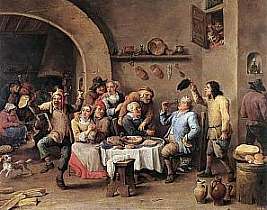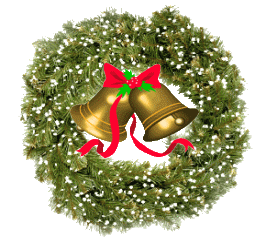| CHRISTMAS AT COURT 
LORD OF MISRULE The Lord of Misrule, also called Abbot of Misrule or King of Misrule, official of the late medieval and early Tudor period in England, was specially appointed to manage the Christmas festivities held at court, in the houses of great noblemen, in the law schools of the Inns of Court, and in many of the colleges at the universities of Cambridge and Oxford. During his reign, which lasted anywhere from 12 days to 3 months, the Lord of Misrule was responsible for arranging and directing all Christmas entertainment, including elaborate masques and processions, plays, and feasts. The lord himself usually presided over these affairs with a mock court and received comic homage from the revelers. The Lord of Misrule is one of the lost characters of the riotous Medieval Christmas celebration. Sometime in November, it was customary among the European peasantry to draw lots for the title of Lord of Misrule. Wearing a paper crown and motley garments, the Lord of Misrule turned the ordinary rules on their head for his appointed time. He was given full license to enjoy whatever pleasures he desired, and to lead the others down the merry path of dalliance and delight. One can only imagine what sorts of delight prevailed, but certainly the kind that comes in a flagon must have been especially indulged. The crowning of the Lord of Misrule is a tradition extending back into ancient times, and was a feature of Roman Saturnalia. Records from as late as the 3rd century suggest that the merry reign of the king of the revels came to a rather unjolly end when the chosen one was unceremoniously sacrificed on the altar of Saturn. In the Middle Ages, the tradition was revived in a more moderate form, most sacrificial elements removed or replaced by the less barbarous practice of burning the god in effigy. A remnant of this ancient custom clings to the current practice of pulling Christmas crackers: after the muffled explosion of the cracker, the prizes are generally revealed to be a joke, a charm, and the paper crown of the Lord of Misrule. Out on the streets among the common people, the Lord of Misrule was head of the Mummers, a traveling band of rowdy players who roamed the streets in costume performing plays, songs, and so on. Though they stuck to the streets for the most part, the Mummers were sometimes known to barge into churches and disrupt the service, an act that did not sit well with church officials. The Mummers, roving street carousers all, offered just about anything that would win the attention of passersby. The classic Mummer's play has a number of variations, but it always focuses on the death and revival of one of the principals. Like carolers, Mummers would often perform in exchange for goodies, though their performances were often disruptive. When the Puritans came to power, they did away with the Lord of Misrule and his companions. Though the restored monarchy reinstated most of the Christmas traditions outlawed by the Puritans, the Lord of Misrule remained an outlaw. He and the Mummers never again enjoyed the freedom and popularity they had in medieval England. 
Backgrounds & page design by ForeverAmber |
 Free Forum Hosting
Free Forum Hosting